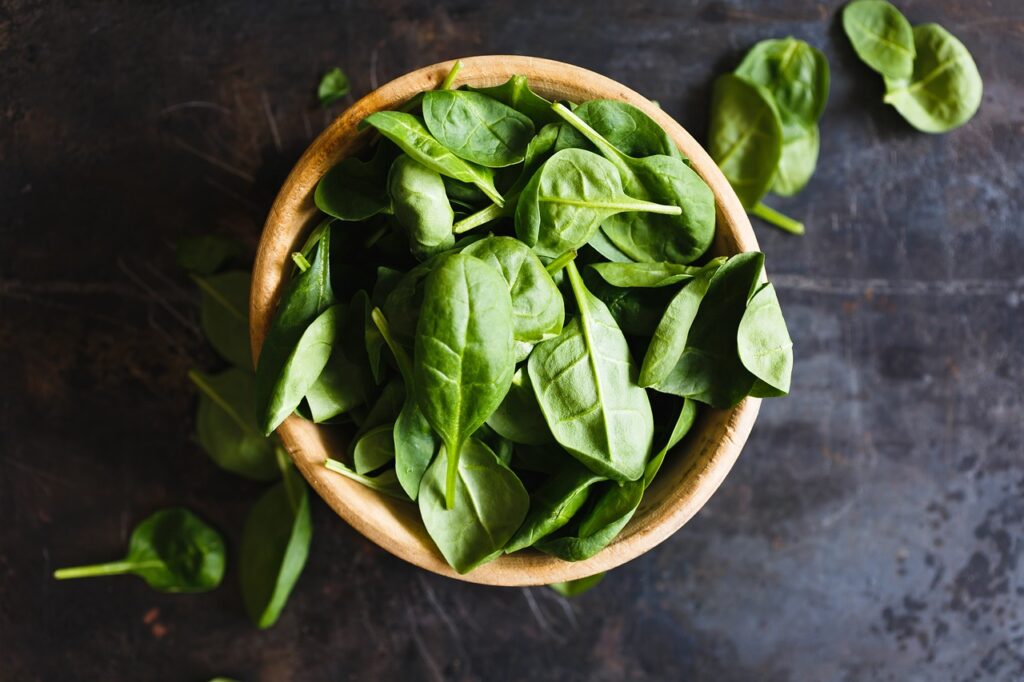Herbs are healthy and should be used in cooking.
Everyone knows that a balanced diet rich in fruits and vegetables is essential to maintaining a robust immune system. On the other hand, herbs are an excellent method to increase our food's nutrient density while enhancing its flavor. Herbs provide several health advantages that you may not be aware of, in addition to their delightful flavor. One benefit that comes to mind is using herbs to flavor meals instead of salt. Keeping our blood pressure and heart rates in check is made possible by this simple change, as salt primarily contributes to high blood pressure and cardiac stress.

Basil
This brightly colored, aromatic plant has several health advantages and comes in over sixty different types. Because to the carotenoids lutein and zeaxanthin, basil is excellent for maintaining eyesight and improving eye health. The anti-oxidants included in basil can aid the body in warding off the effects of free radicals, which can damage cells, cause illness, and speed up aging. If you have a family history of cancer, diabetes, or arthritis, including basil in your diet may help lower your risk.
Due to its ability to control blood sugar, basil aids in preventing diabetes. It also reduces inflammation, which makes it helpful in treating inflammatory pain diseases like arthritis (2). It has been discovered to have anti-cancer qualities and can aid in treating several malignancies, including those of the liver, lungs, mouth, and skin. Lastly, basil has been shown to enhance mood and reduce depressive symptoms.
Cilantro (aka coriander)
In Asian cooking, cilantro is a common ingredient. It is also known as coriander, and people have different ideas about how much they like it. People generally have strong opinions on it, either for or against it. The leaves and seeds of cilantro have a citrusy flavor, yet other people claim they taste like soap. Linalool, an essential oil from coriander seeds, has long been used to treat stomach upset, especially that brought on by bacterial illnesses and food poisoning. This is due to the presence of antibiotic and antibacterial substances.
Coriander seeds have been shown to lower blood cholesterol levels and prevent atherosclerosis, the buildup of plaque in blood arteries that can cause strokes and heart disease. The health advantages of coriander are maximized when combined with other spices like ginger, turmeric, and garlic.
Dill
The dill plant's feathery leaves, seeds, and essential oil have all been shown to offer health benefits. These advantages are brought on by the chemicals in this herb's anti-oxidant action. Plant chemicals including proanthocyanins, flavonoids, and phenols can help lower “bad” cholesterol while raising “good” cholesterol in the blood. Triglycerides are another type of blood fat. Also, they can aid in maintaining a healthy blood sugar level, which is important in the battle against diabetes. Finally, this aromatic plant can help in the fight against cancer and bacterial infections. Consuming dill might assist with stomach disorders.
Dill is a delicate plant with an anise-like flavor. It goes well with salmon, but it also goes well with eggs, salads, soups, and herb butter.
Mint
Mint is a pleasant plant that grows quickly. Because of this, it's better to keep it in a pot unless you want it to take over your garden. Traditionally served with lamb, mint is also a wonderful addition to various other foods, including dips, sauces, salads, and even tea. You may have noticed that toothpaste has a minty flavor. This is because mint eliminates the bacteria that cause bad breath, making it a wonderful breath freshener. Sniffing mint essential oil has been demonstrated to boost memory and attentiveness.
Mint is excellent for relieving stomach and digestive ailments including bloating and gas. Irritable bowel syndrome and gastroesophageal reflux illness are two conditions that can benefit from its use. When you have a cold, the menthol in mint might help open up your nose and throat. Colds and flu are attacked from two fronts by the anti-bacterial characteristics.
Oregano
Another herb utilized in Italian and other Mediterranean cooking is oregano. It tastes and is closely linked to marjoram. The flavor can be slightly bitter, and the scent is reminiscent of camphor.
Carvacrol and thymol, two phenolic compounds found in oregano, are helpful at reducing “bad” cholesterol and raising “good” cholesterol levels in the blood. If administered for around six weeks, oregano essential oil has been demonstrated to eradicate parasite infestations. It is effective against fungi like Candida. Hopefully, you won't have any parasitic or fungal illnesses. But, if you have them and would rather not take medicine, oregano can help you get rid of them.
The majority of people are familiar with the herb parsley. It is frequently used as a garnish and might have flat or curled leaves. Parsley, like mint, may be used to mask the taste of garlic and other strong flavors in the mouth and prevent bad breath. Parsley has also been demonstrated to kill germs in the lab, however, this hasn't been shown in humans just yet. Flavones, of which apigenin is the most beneficial, are found in parsley. While it may also be found in oregano and chamomile, parsley has most of it. The beneficial component is significantly more concentrated when parsley is dried. Apigenin has been shown in several trials to be effective in the battle against cancer. This is because it inhibits the growth of cancer cells, lowers inflammation, protects DNA, and keeps new blood vessels from developing around tumors, thus starving the diseased cells. Due to its high vitamin K content, parsley is excellent for maintaining strong bones and avoiding fractures and osteoporosis. If you are hurt and start bleeding, vitamin K helps your blood clot so you can stop the bleeding and get better faster. As a diuretic, parsley can help your kidneys and lower your blood pressure. In addition to vitamin K, parsley is rich in vitamin A, lutein, and zeaxanthin, all of which contribute to the protection of eyesight and the maintenance of healthy eyes.
As you can see, parsley is a very adaptable herb that is well worth including in your recipes. It may be used in salads uncooked or as a garnish on a variety of foods. It may also be used to season sauces, soups, and a wide variety of other meals. Or just chew it to keep your breath minty.
These are just a handful of the many herbs you may use in your cuisine to stay healthy. Almost every herb and spice you can imagine has at least one health advantage. They may be included in a wide variety of preparations. Why aren't you utilizing them at this point, then?
- Salt and your blood pressure https://www.bloodpressureuk.org/your-blood-pressure/how-to-lower-your-blood-pressure/healthy-eating/salt-and-your-blood-pressure/
- Chemical components and pharmacological benefits of Basil (Ocimum basilicum): a review https://www.tandfonline.com/doi/full/10.1080/10942912.2020.1828456
- In Vitro and In Vivo Anticancer Activity of Basil (Ocimum spp.): Current Insights and Future Prospectshttps://www.mdpi.com/2072-6694/14/10/2375
- Coriander: Overview of Potential Health Benefits https://www.researchgate.net/profile/Keith-Singletary/publication/303776980_Coriander_Overview_of_Potential_Health_Benefits/links/5ffe0de392851c13fe09c28d/Coriander-Overview-of-Potential-Health-Benefits.pdf
- Antioxidant properties of coriander essential oil and linalool and their potential to control Campylobacter spp. https://bit.ly/4000sAJ
- The cholesterol lowering property of coriander seeds (Coriandrum sativum): Mechanism of action http://www.jeb.co.in/journal_issues/200801_jan08/paper_08.pdf
- The Role of Anethum graveolens L. (Dill) in the Management of Diabetes https://www.hindawi.com/journals/jtm/2016/1098916/
- Antibacterial and antioxidant activities of Mentha piperita L. https://www.sciencedirect.com/science/article/pii/S1878535211000232
- Modulation of Cognitive Performance and Mood by Aromas of Peppermint and Ylang-Ylang https://core.ac.uk/reader/9983853?utm_source=linkout
- Effects of Peppermint and Cinnamon Odor Administration on Simulated Driving Alertness, Mood and Workload http://www.aromaticscience.com/effects-of-peppermint-and-cinnamon-odor-administration-on-simulated-driving-alertness-mood-and-workload/
- Peppermint https://www.mountsinai.org/health-library/herb/peppermint
- Oregano https://www.mccormickscienceinstitute.com/resources/culinary-spices/herbs-spices/oregano_old
- Effects of Origanum onites on Endothelial Function and Serum Biochemical Markers in Hyperlipidaemic Patients https://journals.sagepub.com/doi/pdf/10.1177/147323000803600621
- Inhibition of Enteric Parasites by Emulsified Oil of Oregano in vivo https://www.researchgate.net/profile/William-Sparks-3/publication/12502938_Inhibition_of_enteric_parasites_by_emulsified_oil_of_oregano_in_vivo/links/5eb98a5f92851cd50dab33b5/Inhibition-of-enteric-parasites-by-emulsified-oil-of-oregano-in-vivo.pdf
- Carvacrol Induces Candida albicans Apoptosis Associated With Ca2+/Calcineurin Pathway https://www.ncbi.nlm.nih.gov/pmc/articles/PMC7203418/
- Effects of food materials on removal of Allium-specific volatile sulfur compounds https://pubmed.ncbi.nlm.nih.gov/12059171/
- Apigenin alleviates the symptoms of Staphylococcus aureus pneumonia by inhibiting the production of alpha-hemolysin https://pubmed.ncbi.nlm.nih.gov/23113475/
- Plant flavone apigenin: An emerging anticancer agent https://www.ncbi.nlm.nih.gov/pmc/articles/PMC5791748/
- 8 Impressive Health Benefits and Uses of Parsley https://www.healthline.com/nutrition/parsley-benefits#
- Health Benefits of Parsley https://www.webmd.com/diet/health-benefits-parsley
The post Healthy Herbs You Should Be Cooking With appeared first on https://gqcentral.co.uk


